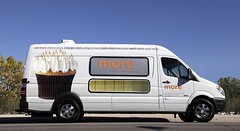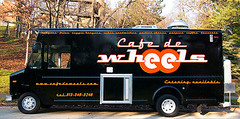 As our industry becomes more main stream throughout the country, more and more cities are beginning to look at starting a dialog to determine if food trucks have a place in their communities. We have researched many of the common points brought up by those opposing mobile vendors. Although many of those against the rise of food trucks have ulterior motives that circle back to the brick and mortar restaurant industry. If the industry is to continue its growth, we need to identify those issues, sit down and civilly discuss that food trucks are not the danger to restaurants and communities that many are trying to convince cities they are.
As our industry becomes more main stream throughout the country, more and more cities are beginning to look at starting a dialog to determine if food trucks have a place in their communities. We have researched many of the common points brought up by those opposing mobile vendors. Although many of those against the rise of food trucks have ulterior motives that circle back to the brick and mortar restaurant industry. If the industry is to continue its growth, we need to identify those issues, sit down and civilly discuss that food trucks are not the danger to restaurants and communities that many are trying to convince cities they are.
Food Trucks don’t pay rent.
They may not have leases or rent payments as high as restaurants, but food trucks still have to pay for commissary space to clean and restock their “kitchens,” they pay for licenses, permits, food and staff. In many communities, food trucks also are legally required to pay for rent on storage space and commissaries where they do most of the prep work. In cities such as San Francisco, mobile vendors are charged upwards of $10,000 a year to maintain their licenses in certain districts. New York City has a limit of permits they issue to street vendors which include trucks and carts. Outside of liquor licenses, cities do not limit the amount of restaurants which can operate within their city limits.
Food Trucks unfairly compete with brick and mortar restaurants.
One of the most common complaints by dissenters is that Food Truck operator’s relatively low costs give them “an unfair advantage”. Before the recent uptick in mobile food vendors across the country, this occurrence in the restaurant industry was always referred to as a “competitive advantage.” So long as the owner of a competitive advantage was passing the benefit of their “advantage” to their customers in terms of value both economically and the quality of their cuisine, this has always been looked at as a positive. The fact that the mobile catering industry has changed its perceived limitation as a “food of only convenience” is what has shifted consumer perception. The current emphasis on value in the market strongly favors the Food Truck model, and is what has attracted many consumers to the new generation of food trucks.
Food Trucks only go to trendy areas and potentially prevent new food centered areas from emerging.
Of course food trucks go to trendy areas, food trucks thrive in areas with high foot traffic, but at the same time, isn’t that what restaurant owners try to do when they open up? They find areas where their business model has the best chance to succeed. Why should food trucks be held down to a foundation or lease if all they have to do is start up their truck and drive to another area where consumers spend their time?
It can also be said that trucks develop something close to cults. Food trucks have followers, the difference lies in their devotion and as shown to date, food truck followers will follow their food wherever it is, so new trendy areas can be created by food trucks that new restaurateurs can follow if they choose.
Food Trucks leave clouds of diesel fumes and noise in their wake.
The longer the food truck industry is popular; technology will help it to become greener. Many trucks around the country already run their vehicles off the vegetable oil they produce so as to cut down on oil costs for fuel and the emissions their trucks create. If they are so concerned about the environment, are they as critical of restaurants that generate upwards of 41% of their carbon foot print from merely heating and lighting their restaurants? Dependent on the area of the country and what is their source of power generation, I’d certainly take a food truck that is driving around town on vegetable oil or biodiesel, over a restaurant that requires nuclear or coal based power generation.
Food Trucks generate more trash in areas with already overflowing trashcans and few sidewalk recycling bins.
This is an area where we may be in agreement currently, however the food truck industry is evolving. An example of this can be seen in San Francisco where the group Off the Grid has created lots for food truck festivals throughout the week. When they started, they were holding 3 hour events where approximately 300 hundred consumers attended every hour, now they are holding 4 hour events with upwards of 700 consumers showing up every hour. Their solution? Asking each vendor to provide a trash can outside of their vehicle as well as charging each truck a little more for their participation so the event planners can hire more assistance to help clean up the site.
Food Trucks create more traffic on the streets, thus more deaths related to crashes will increase.
Since food trucks spend the majority of their operating time parked in a lot or a parking spot selling their fare, this point seems moot. Another way to look at this argument is that food trucks use social media to inform customers of their location from day to day. Much of their sales come from people already in the area, as opposed to many brick and mortar establishments which get people taking taxis or driving themselves to the restaurant’s permanent location. Imagine the cuts in deaths due to traffic incidents if people stopped using taxis or personal vehicles to get to their food source?
These are far from all of the negative points driven by those who do not back the food truck industry, but we have found these to be the most common. If you are aware of other topics which are used to attempt to dissuade municipalities from approving laws and regulations which allow food trucks into their community, please forward them along to us, and we will follow up this article with those additions.









For those of you looking for a great way to track all of the DC Food Trucks on a map, check out http://www.thestrEATS.com!